- Home
- Jane Smiley
True Blue Page 4
True Blue Read online
Page 4
I said, “Yes, Rusty. Time to go in.”
I walked past Blue’s pen without trying to talk to him again.
Winter Blanket
Summer Sheet
Chapter 4
WHEN I GOT INTO THE HOUSE, MOM WAS JUST GETTING OFF THE phone. She said, “Well, we’ve never done that before, but we’ll talk about it. I’ll let you know. That could be fun. We’ll see. Byyye.” The “bye” sounded extra long, as if she didn’t know the person on the other end of the line very well. When she saw me, she said, “Guess who that was?”
“I don’t know.”
“Mrs. Goldman. Barbara wants to take riding lessons.”
“She told me that.”
“Is she serious?”
“Well.” I thought for a moment. “She’s never serious, but she’s always serious. I mean, she loves to make people laugh, but she never says she wants to do something and doesn’t mean it.” I told her about the volleyball.
“It’s such a responsibility,” said Mom. “And Jane would be happy to teach her.”
“I guess she doesn’t want to go all the way out there.”
“Does she always get what she wants?”
I thought about this for a moment, then nodded.
Mom grinned and said, “Well, maybe she should meet your dad.”
“Maybe he should meet her.”
Mom gave me a little squeeze.
I was about to go upstairs to do my homework, which was just some reading for social studies and a chapter of Tom Sawyer, when Daddy beckoned me into his study. He pointed to the Bible on his desk and said, “The Lord will provide.”
I stood there for a moment, then walked over to the desk and flipped open the Book. Daddy said, “Read where your eye falls.”
I said, “ ‘The righteous perish and no one ponders it in his heart; devout men are taken away and no one under—’ ”
Daddy said, “Try again. Isaiah is a little scary.”
I flipped some pages. Daddy had his eyes closed. I tried really hard to focus on the first word I saw, which was O. I paused for a moment, then read, “ ‘O unbelieving generation,’ Jesus said, ‘how long shall I stay with you? How long shall I put up with you? Bring the boy to me.’ ” I looked up.
Daddy’s eyes were open now, and he looked happy. He said, “That line always made me laugh. I love it when Jesus gets fed up.” He cleared his throat. “Anyway, I know you’re nervous about the gray horse, Abby. I don’t quite understand how this turned into such a big deal, either for him or for us—”
“It’s all that stuff. I feel like he’s … haunted or something.”
“He’s not haunted. He’s just a nervous type.”
“How did she die?”
“I don’t—” But then he pursed his lips and said, “She had had too much to drink, and I guess she saw something, or thought she saw something, in the road, and swerved to avoid it.”
“What did she hit?”
“A tree. Flipped the car.”
“When did they find her?”
“Early in the morning.”
“Why do people do that?”
“Do what?”
“Get drunk and then drive a car?”
“I don’t know, Abby. But we didn’t know her. We can pray for her soul to rest in peace, as we would for the soul of anyone. The world is full of people who die every minute, and we can pray for all their souls.”
“I thought when I opened the one trunk that there was a smell.”
“What kind of a smell?”
“Like a perfume. Not bad. But not horsey or sweaty.”
“There may indeed have been a fragrance. I don’t know. I didn’t smell it.”
“Do you think that there are such things as ghosts?”
“No, I do not.”
“But …” In fact, I hadn’t thought about there being a ghost, or ghosts at all, before we started talking, and when I smelled that fragrance, I had noticed it, but I didn’t think anything of it. Barns are full of fragrances—hay, straw, tack, the scent of flowers floating in from the pastures, manure, of course, which is a good smell, not a bad smell. But now I said, “Why not?”
“Because when a person dies, his body is buried and awaits the Second Coming, and his soul goes to heaven or hell. There’s no intermediate place, where ghosts wander around or anything like that.”
His voice was easygoing, but I understood that this was a rule. NO ghosts. Daddy said, “Are they telling you at school that ghosts are real?”
“There was a ghost in Julius Caesar. Julius appeared to Brutus.”
“That was a play.”
“It was Shakespeare.”
Daddy gave me a look that told me he didn’t know where to begin.
“This is partly why you kids haven’t been allowed to go to the movies. You get all of this nonsense in your heads and then you think—”
“My teacher said Shakespeare was the greatest writer ever in history.”
“Well, other teachers might agree with her or not, but Shakespeare was HUMAN, and he was writing for MONEY, so he let people see things in his plays that would get them all excited and make them tell their friends about the play. That’s the category that I would put ghosts into. There are no ghosts. That lady, Blue’s owner, is not a ghost haunting him. He’s a spoo—a nervous type of horse, and he will settle down, and we will make something of him, okay? I’m sure once he’s been in with Lincoln and Jefferson for a week, he’ll be completely fine. Do you understand?”
I nodded. I had noticed how he avoided the word spooky. But I didn’t say anything.
“Jesus said, ‘How long shall I put up with you?’ ” Then he stood up and kissed me on the top of the head.
“I better do my homework.”
“I’ll put Blue in a stall for the night, one where he can look out the door and see the mares. Since he’s been in a stall, he might feel more secure in there. He’s settled down quite a bit even since he got here.”
“I guess. Yes, I guess he has.”
But as I walked up to my room, I felt like the barn was full of ghosts, or a ghost, the ghost of Mary Carson. Then I thought, Maybe that will make Blue feel better.
I read more about Tom Sawyer, who by this time was interested in a girl named Becky, who gets sick, and stays home for what seems like weeks and weeks, or at least long enough so that his aunt gets worried and gives Tom “the water treatment,” which is throwing buckets of cold water at him first thing in the morning, then scrubbing him down with a rough towel, then rolling him in a wet sheet and covering him with hot blankets until he sweats yellow. Then it gets worse. The book never says what’s wrong with the girl, either, only that Tom goes out and sticks around her house late at night, so it seems like he does whatever he pleases. Then somehow after that, he poisons the cat, and after that, Becky Thatcher comes back to school, and Tom and his friends go out on the river and get a ham and build a fire. Even though they are about my age, no one pays any attention to a thing they do. It was hard to keep track of and put me to sleep. Which was good. I did not dream of Blue; I dreamt of the Mississippi River, which I had never once seen. I love that you can dream of things that you don’t know about.
In the morning, it was still dark when I was getting up, but by the time I got around to feeding Blue, it was light enough for me to see him and for him to see me. I fed him last because he didn’t know the schedule, and the others did. They could see the light go on in the kitchen, and they could see me come out the back door, and they could see Rusty come around the house to meet me, and from all of this, they knew they were about to get their hay, which of course they had been waiting for all night long, and just because every single one of them was sleek and fat didn’t mean that they weren’t starving to death. Amazon and Foxy were the whinniers; Happy snorted and nickered; Sprinkles tossed her head. In the gelding pasture, Lincoln and Jefferson walked around, and Jack went over to the gate, where he ran his teeth along one of the metal slats, makin
g a grating sound. He only did it once each feeding, and I never understood where he learned it, but since making that sound always resulted in me throwing the hay over the fence, he must have thought it worked.
I took the last flake to Blue, who was standing against the door of his stall, staring out the doorway of the barn. I threw the hay right over the door, and he put his head down to it. He ate one bite, then lifted his head and looked at me and the mares. Then he took another bite. Well, two bites and one look was better than one bite and one look. Out of the corner of my eye, I saw a woman sitting on one of the tack trunks, but when I whipped around and stared, I realized it was just a shirt of Daddy’s, hanging from a hook. Even so, my heart was pounding as though I had seen a ghost. It did not help that just at that moment, Blue gave a loud whinny and Rusty came in the door of the barn and dropped something on the floor. It squeaked. I said, “Rusty, what have you got?” and went over.
I knelt down and looked at it. It was a kitten—a black kitten, but with two white toes on each front foot. Rusty sat and looked at me, then looked down at the kitten again. She wagged her tail. I scooped the kitten up in my hands and brought it near my face so I could see it. It looked about three or four weeks old—fluffy and big-headed, but with its eyes open. It was not old enough to be away from the mother, but it was old enough to creep around. I stood up and put it under my shirt to keep it warm.
Mom was making breakfast when I went in the house. I lifted my shirt and showed her the kitten. “Rusty found it. She brought it into the barn and put it down on the floor.” I could see Rusty out on the porch, watching us through the window. Mom petted the top of the kitten’s head with her forefinger, then opened a drawer and took out a clean dish towel, which she made into a nest inside a big wide pot on the counter. I put the kitten into it.
Mom said, “I hadn’t realized Bossy had a litter.”
I said, “But it’s black.” Bossy was a gray tabby. We called her a barn cat, but really, she was a feral cat who sometimes came around. The other female barn cat, Doozy, had been spayed, but we hadn’t ever been able to catch Bossy.
Mom said, “That’s true, a tabby never produces a black. Isn’t it cute?” The male barn cat was a tabby, too, but orange, named Clyde. I heard him in the barn more often than I saw him, but I sometimes saw him leaping or running out on the hillside.
By this time, the kitten was sitting up in its little nest, mewing, but it wasn’t trying to get out. The important thing with a kitten is keeping it warm. Mom said, “Rusty is such a busybody. The last thing I need right now is a kitten to raise.” But she petted it on the head again and said, “Yes, you’re cute. I’ll find you a basket after breakfast.”
I sat down at the table. She put my scrambled eggs in front of me and said, “At least it’s pretty old. It’ll be eating solid food any time now. What shall we name it?”
I said, “Spooky.”
I don’t know why I said that.
Rope Halter
Western Bridle
Chapter 5
BLUE DID SEEM TO SETTLE DOWN WELL ENOUGH. HE WAS BETTER in the stall than he was in the pen, though we put him in the pen to stretch his legs every day for two or three hours. After a couple of days, Daddy threw some extra hay into the pen and put Lincoln in there with him—Lincoln was the more easygoing of the two geldings. Daddy set out three piles of hay far apart from one another, and then when Blue was eating, he opened the gate and let Lincoln go in. Blue raised his head and pinned his ears. Daddy and I leaned against the gate and watched them. Lincoln inspected the two free piles, and then chose one and started eating. Blue lifted his head again, and pinned his ears again, but he didn’t move toward Lincoln. All Lincoln did was switch his tail in a meaningful manner and cock his right hind foot. Blue was saying, “This is my pile,” and Lincoln was saying, “Yes, but this is my pile.”
There seemed not to be much disagreement. After a bit, Blue moved to the third pile, and Lincoln tried Blue’s pile, and so on. By the time the hay was eaten, Daddy and I had ridden Foxy and Happy. The two geldings now seemed not friends but not enemies, so Daddy went into the pen and got them to trot around a bit together. Lincoln did as he was told, and did not seem to notice Blue, but trotted past him and in front of him and across his path. Every time he did, Blue moved out of the way or paused. Daddy said, “That’s good. Always remember that the one who seems to be ignoring the other one is the boss. We want Lincoln to be the boss here, because he’s already the boss of the pasture. We don’t want Blue to go out there and challenge him.”
“Blue doesn’t seem like a very brave horse.”
“He’s sensitive and he’s observant. That can be good and it can be bad.”
When I put Blue away in his stall, I brushed him down, which he seemed to like.
The next day, it was time to ride him. As soon as the school bus dropped me at the gate, I ran in and threw down my books. I had been thinking about Blue all day, thinking about this first ride. I knew that Jane said he didn’t do much, but he was so beautiful that I couldn’t help feeling that he had to be one of the good ones, a horse like Black George, the one we sold to Sophia Rosebury, who loved his work and did it all so well that people just stared at him. All through my last class, which was math, I kept imagining going to the horse show on Blue and having everyone stare at us—what a beautiful horse he is; look at how he takes those fences; Abby Lovitt trained him; champion, best ever, perfect.
Blue had spent the day with Jefferson, and they were still in the pen together. They both came to the gate, and they didn’t squeal or step out of each other’s way, which meant that they had made friends, or at least accepted one another. Jefferson was the first to look into my hands, so he was the boss, but since he wasn’t pushing Blue out of the way, he wasn’t making absolutely sure that Blue understood every moment of the day that he, Jefferson, was the boss—at least of Blue—and would always be the boss. I went in and put a rope halter on Blue (not his leather one with the brass nameplate), and Daddy took Jefferson and crosstied him in the barn.
I did not open the blue trunk and take out Blue’s saddle and bridle—I put my own saddle on him, with a nice thick blanket, and one of the simpler western bridles. I thought I would be safer for the first ride in equipment that was familiar to me and a little heavy. But I did put on my hard hat.
Daddy tacked up Jefferson, and we led them to the pen. I went in with my flag, which was a white rag tied to the end of a whip, and got them to go around me. There was no reason to think that Blue had ever done this before, but Jefferson had—I worked him in the pen every week or so, not because he was badly behaved, but because he needed to be reminded to get going from time to time. With Blue in the pen, he was happy to show off a little, and so he trotted around with his ears up and his tail up, and Blue trotted after him, doing what he was told. After they had gone around to the left three or four times, I stepped back and to the right, and Jefferson made a smooth turn and began trotting to the right. Blue stared at him, then followed him. In a moment, they were both trotting to the right. When they picked up the canter, I saw what the bonus was going to be.
Because Blue had a nice trot—even and steady and balanced, but nevertheless nothing eye-popping, nothing like, say, Jack’s trot, which was huge and floating, or Happy’s trot, which was exact and perfectly sure-footed. It was not a trot to remember. But his canter was so effortless and graceful that it was like a ball rolling. It made Jefferson look as though he was on a pogo stick, popping around the pen. Blue didn’t push himself forward and he didn’t hang back; he just folded and unfolded and glided along. I couldn’t stop watching. Behind me, leaning on the fence, Daddy said, “If he’s not a Thoroughbred, I can’t imagine what he could be.”
We watched him for two circuits of the pen, and then I stepped back, and the two horses slowed to a trot. Jefferson, knowing what to do, arced around and headed in the other direction. After a couple of seconds, Jefferson picked up the canter. Blue followed him. To th
e left, Jefferson stayed in front. Blue didn’t pass him either by coming in toward the center or slipping by him on the outside—by not passing him, Blue showed that he respected him. But Jefferson didn’t maintain a steady pace. You could see that he couldn’t make up his mind. On the one hand, he was naturally lazy, but on the other hand, he wanted to show off for Blue, and he couldn’t decide the best way to do that. Blue, though, was so easy in his canter that when Jefferson sped up, he lengthened his stride just a bit, and when Jefferson slowed down, he shortened his stride the right amount. There was even one point where Jefferson was trotting and Blue was still cantering, but so easy and collected (which was a word Jane Slater used for a small but not lazy canter or trot) that he stayed right behind him.
“Nice,” said Daddy.
Now the horses both subsided into the trot, and then I let them slow down, which they did. Jefferson walked for a moment, then turned toward me, his ears pricked. Blue stayed on the fence, but he looked at me. Daddy climbed the fence and went to get Jefferson. I walked over to Blue. Daddy took Jefferson out, and I led Blue over to the fence and stood him up beside it. Then I climbed on.

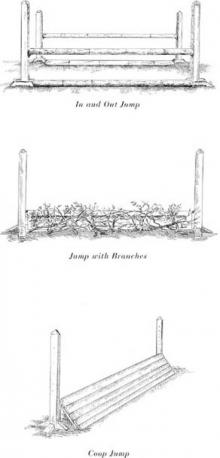 The Georges and the Jewels
The Georges and the Jewels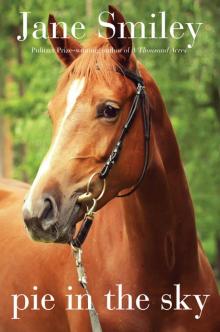 Pie in the Sky: Book Four of the Horses of Oak Valley Ranch
Pie in the Sky: Book Four of the Horses of Oak Valley Ranch Duplicate Keys
Duplicate Keys Charles Dickens
Charles Dickens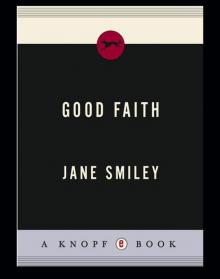 Good Faith
Good Faith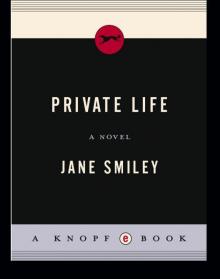 Private Life
Private Life A Thousand Acres: A Novel
A Thousand Acres: A Novel The Greenlanders
The Greenlanders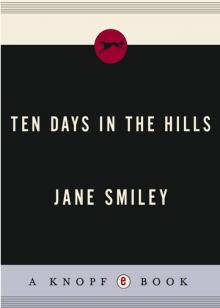 Ten Days in the Hills
Ten Days in the Hills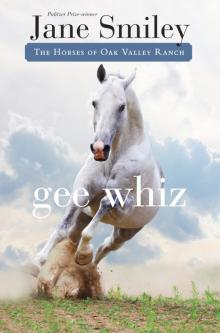 Gee Whiz: Book Five of the Horses of Oak Valley Ranch
Gee Whiz: Book Five of the Horses of Oak Valley Ranch A Thousand Acres
A Thousand Acres The All-True Travels and Adventures of Lidie Newton
The All-True Travels and Adventures of Lidie Newton Ordinary Love and Good Will
Ordinary Love and Good Will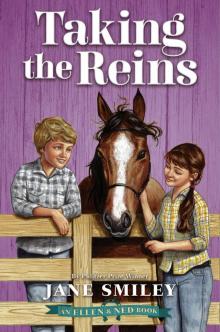 Taking the Reins (An Ellen & Ned Book)
Taking the Reins (An Ellen & Ned Book) The Man Who Invented the Computer
The Man Who Invented the Computer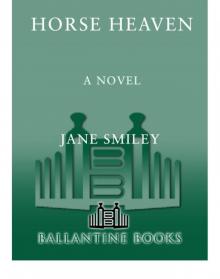 Horse Heaven
Horse Heaven The Age of Grief
The Age of Grief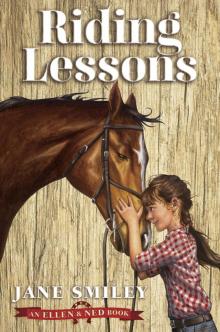 Riding Lessons
Riding Lessons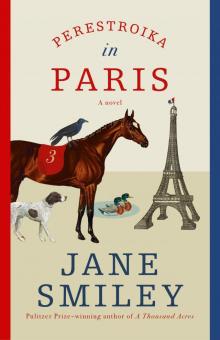 Perestroika in Paris
Perestroika in Paris A Good Horse: Book Two of the Horses of Oak Valley Ranch
A Good Horse: Book Two of the Horses of Oak Valley Ranch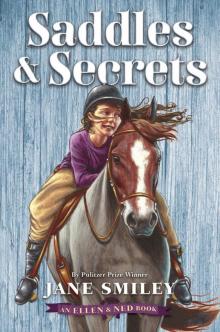 Saddles & Secrets (An Ellen & Ned Book)
Saddles & Secrets (An Ellen & Ned Book)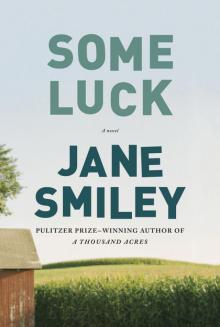 Some Luck: A Novel
Some Luck: A Novel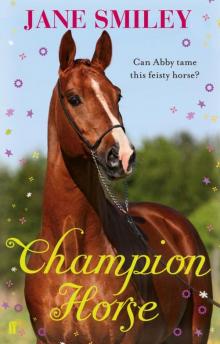 Champion Horse
Champion Horse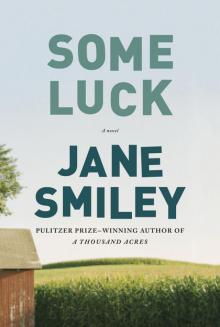 Some Luck
Some Luck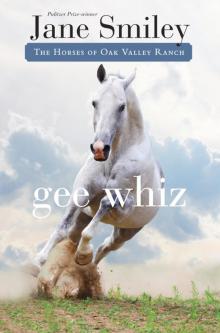 Gee Whiz
Gee Whiz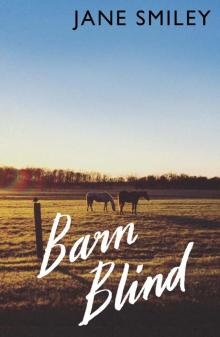 Barn Blind
Barn Blind A Thousand Acres (1992 Pulitzer Prize)
A Thousand Acres (1992 Pulitzer Prize)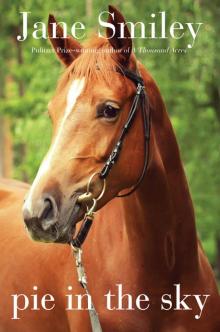 Pie in the Sky
Pie in the Sky True Blue
True Blue A Thousand Acres_A Novel
A Thousand Acres_A Novel A Good Horse
A Good Horse